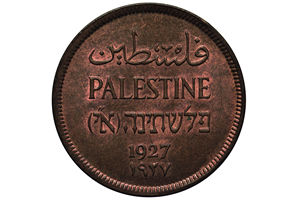
What Does the Name “Palestine” Mean?
The general consensus is that the name “Palestine” comes from the Philistines, and means something like “land of the Philistines.” In 135 AD, after the second Jewish revolt, Emperor Hadrian gave the name “Palestine” to the area, so that it would no longer be called Israel. But we should wonder, is our assumption about the name correct?
THE FIRST APPEARANCE OF THE NAME “PALESTINE”
In the 5th century BC, the Greek historian Herodotus called the land between Phoenicia in the north and Egypt in the south a “district of Syria, called Palaistinê.”
In the Hebrew Bible, the land of the Philistines is called Peleshet, and its extent on the southern coastal strip of the territory is clearly defined. In the Septuagint (the Greek translation of the Old Testament), which was written around 200 BC, the name of this people was tellingly translated not as Palaistinoi (the word we would expect if derived from Peleshet, and which already existed as seen in Herodotus) but as Philistieim. Why didn’t they use Palaistinoi if that was supposedly a name for the Philistines?
Herodotus referred to the inhabitants of Palestine as circumcised. This would have been true of the Israelites, but obviously not of the Philistines.
One hundred or so years later, Aristotle also describes Palestine and mentions the Dead Sea. But Philistine territory was far from the Dead Sea.
Later, Roman writers also used the name Palestine for the country, mentioning that the nation’s inhabitants kept the Sabbath. Again, this is true of the Jews but not the Philistines.
These and other historical discrepancies led David Jacobson of London University to question the commonly held opinion about the name of Palestine.
 ISRAEL IN THE BIBLE
ISRAEL IN THE BIBLE
The name “Israel” was given to the patriarch Jacob by God Himself, after he wrestled with the Lord (Gen 32:29). From that moment forward, his descendants were called “the people of Israel.” When Israel then took possession of Canaan, the name passed to the land as well.
When the kingdom of Israel was divided into Judea and Israel after Solomon’s reign, the name Israel continued to be used for the people as a whole. However, in order to draw a geographic distinction, Judea became significant as the name for the southern kingdom.
After Sennacherib deported the ten tribes (i.e., the northern kingdom of Israel), the name Israel began to gradually disappear as a designation for the land. This is most clearly evidenced in the term “Jews,” which became the name for the entire people and their religion. The name Israel wasn’t revived until the modern State was founded. But significantly, the term “Jews” is still used generally for the people and their religion today, even those who live elsewhere.
GREEK AS THE DOMINANT LANGUAGE
The land of Israel came under Hellenistic influence in 332 BC, through the conquests of Alexander the Great. Greek was becoming increasingly important as the language of trade, especially later in the Eastern Roman Empire (and by extension, Israel). The fact that the New Testament was written in Greek testifies clearly to this reality.
The Greeks loved to ask people from abroad what the name of their nationality signifies. How did the Israelites answer? The name Israel was derived from their forefather Jacob, who had wrestled with God and whom God Himself had renamed. This story must have made a huge impression on the Greeks, with their mythology.
And what is the ancient Greek word for a wrestler? The answer is astonishing: palaistís, which sounds very similar to Palestine and Palestinians. This startling similarity in sound suggests that the name Palestine has nothing to do with the Philistines, but with the Greek word palaistís for wrestler, because Jacob wrestled with God.
The Greeks also had a fondness for giving countries Greek names that could be understood in their language. Phoenicia and Egypt are two such recognizable examples. Few people are probably aware that the people of ancient Egypt called their country Kemet, meaning “the black land,” referring to the rich soil along the Nile.
The same pattern is evident in modern country names. The United States is known as Les Êtats-Unis in French, Los Estados Unidos in Spanish, and Die Vereinigte Staaten in German—all of which communicate the same thing, but in the language of their respective peoples. You’re no doubt aware of further examples.
THE DECLINE OF THE HEBREW LANGUAGE
With the Jewish revolt against the Romans and the destruction of both the temple and the city of Jerusalem in 70 AD, Judaism (and with it the Hebrew language) quickly declined in relevance in the region.
After the second Jewish revolt against the Romans in 132-135 AD was a disastrous failure, Hebrew no longer held any importance in the land. As a result, it makes complete sense that the country would no longer be called Judea, and definitely not Israel, since the name had long since fallen out of use.
The Greek language was now the dominant one, so the country was officially given the long-standing Greek designation of Palestine. And it remained so until the founding of the modern State of Israel.
The theory that the name Palestine is derived from the Philistines is incorrect, because the Philistines were deported into Assyria along with the 10 tribes of the northern kingdom in the 6th century BC. The memory of this people group had faded into history long before the arrival of the Romans.
JERUSALEM RENAMED AELIA CAPITOLINA
The city of Jerusalem wasn’t fully destroyed after the first revolt. But after the second revolt in 135 AD, the Romans decided to pull out all the stops. They thoroughly destroyed anything that could be a reminder of Jerusalem, including the remains of the temple (already in ruins). They then rebuilt Jerusalem as a Roman city.
This all took place under the Emperor Hadrian, whose full name was Publius Aelius Hadrianus. He named the city Colonia Aelia Capitolina, after both himself and Rome’s Capitoline Hill, where the Roman gods were worshiped. But due to the length of the name, it was mostly known as Aelia. It remained that way until 325 AD, when Constantine the Great made it Christianity’s holy city and restored its name.
Jerusalem’s name change to Colonia Aelia Capitolina by Emperor Hadrian is established fact. But Hadrian’s alleged changing of the name from Israel to Palestine, which supposedly meant “land of the Philistines,” is an assumption that doesn’t have a foundation either in history or in linguistics.
 THE UNKNOWN MEANING OF THE NAME PALESTINE
THE UNKNOWN MEANING OF THE NAME PALESTINE
We also use Greek words in English, often fully unaware of their original meanings or that they’re of Greek origin. This is obviously what happened in the case of Palestine. It is also a lovely name with a pleasant sound, and is still used in Bible dictionaries and theological works today (although the name Palestine has now taken on certain implications because of the Israeli-Palestinian conflict). Therefore, it would be best to call the country Israel in both biblical and theological contexts. It is the name that appears in the Bible, whereas the name Palestine does not.
It’s likely that if Palestinians knew that the name Palestine actually means Israel, they’d quickly change it.
News From Israel - 10/2024

